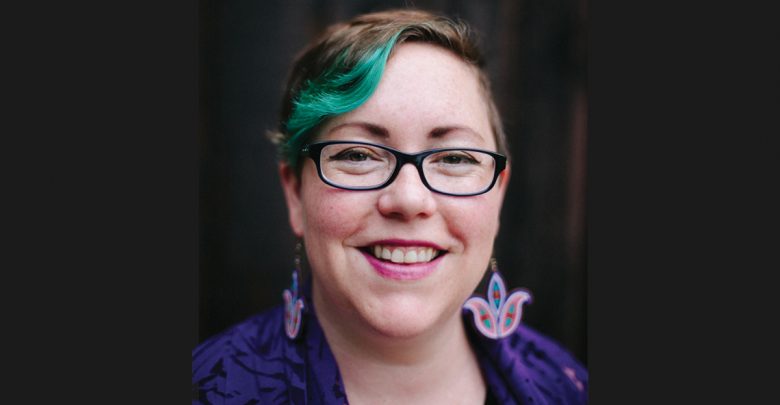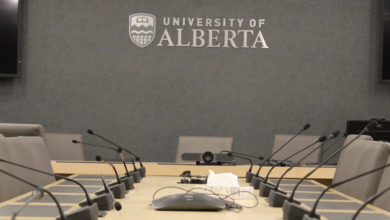 Supplied
SuppliedChelsea Vowel, also known as @apihtawikosisan on Twitter, is tired of explaining that Indigenous people are human.
With her beautifully beaded jewelry and brightly coloured hair, Vowel is a recognizable figure in Pembina Hall, where she works in the faculty of native studies on Cree language curricular development. Vowel is also a full-time graduate student, doing her masters on Métis futurisms, where she looks at Métis perspectives of the past, present, and future in the context of science fiction and related sub-genres. This will be her third degree from the University of Alberta, having completed her bachelor of education in 2000 and her bachelor of law in 2009.
What first brought me to Vowel’s office was her book, Indigenous Writes, published in 2016, which tackles stereotypes and questions that are commonly brought up about Indigenous peoples in Canada. The book is both brutally honest and relatable, the perfect tone for dismantling misconceptions and addressing biases. It began as a series of posts on Vowel’s blog, the first of which was about the federal funding of the Attawapiskat First Nation. The post, on what was just meant to be “an anonymous, geeky language blog,” went viral, and she felt a responsibility to continue doing the work of breaking down information to find the truth.
Vowel describes Indigenous Writes as a “labour saving device,” a way to explain the facts of the Indigenous-Canadian relationship so that conversation can move past the common sticking points: that Indigenous peoples are freeloaders, that they don’t pay taxes, that they are scary and aggressive, that they deserve to be shot or incarcerated.
“These stereotypes have really serious impacts on Indigenous peoples’ lives,” she says. “People use these stereotypes to dehumanize us and to justify all manner of violence against us. Whether it’s trying to justify residential schools or trying to justify not caring about murdered and missing Indigenous women, if they can dehumanize us and say that we’re less than human then all of a sudden it doesn’t matter what happens to us; any amount of violence is okay.”
She wants to move past these stereotypes, to be able to talk about what we can do in the future now that we all agree that Indigenous people are human. But she can’t seem to get there, no matter how many times she discusses it or how many tweets she sends or books she writes.
“Nobody wants to believe that they are part of something evil and bad,” she says. “People get hung up on that guilt stage once they start to realize the truth of the history of Canada, and I think it’s overwhelming… Having to deal with such a huge legacy of what is honestly horrific violence against so many people is too much for people to bear.”
And so Canadians turn to stereotypes to justify their history. Vowel comes face-to-face with these stereotypes in the comments underneath news articles. With the increased visibility of Indigenous peoples and Indigenous issues, “that sort of online racism just really ramped up,” she says. She uses her own social media accounts to respond and show the truth to counter these misconceptions, and has become a visible face in the fight.
“I’m not a mean person, but I play one on Twitter,” she says. “People often come at me in bad faith demanding that I educate them but in a way that is so clear that they’re not actually looking for information, they just want a fight. [Indigenous Writes] for me represents my most honest attempt to reach out.”
I also wanted to talk to Vowel about Indigenous feminism. When I asked her how she views the feminist movement, she brought up the inherent whiteness of mainstream feminism. It has never been a cause with which she’s identified because it doesn’t seem to be about her as a Métis woman.
For some Indigenous women, this rejection of mainstream feminism comes from the way “[the movement] is so inextricably caught up in gender binaries that were brought with colonization,” Vowel says. While not all Indigenous societies were egalitarian, many already had gender equality pre-colonization, and thus many Indigenous women are not fighting against tradition like mainstream feminists. Rather, they would like to take lessons from the past.
As we talked, Vowel told me that during the Women’s March in the United States, Indigenous women were drumming and told to be quiet. Actions such as drumming are things that “Indigenous women do to signify their power and their worth,” but they are seen as being disruptive or not fitting in, Vowel says.
Not all Indigenous women identify as feminists, but that doesn’t mean they don’t care about equality.
“Indigenous women who speak out against gender violence in their communities face an incredible amount of backlash,” she says. “I don’t think white women feminists understand that the violence that Indigenous women face is so severe and so gendered that it’s really difficult for us to organize sometimes. That’s the thing about patriarchy and sexism: it’s the internalisation of it. Women police each other; that’s also very strong in our communities. But what those women assert over and over is that if we once again root ourselves in the land and in relationship to one another, hierarchies like that and subjugation like that simply can’t stand, they’re impossible.”




